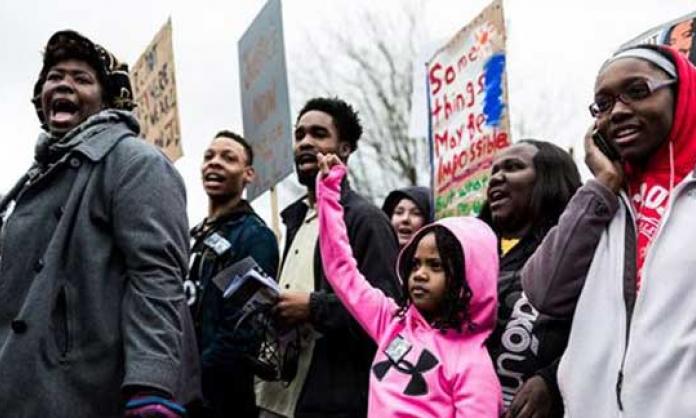The third Monday in January each year is a national holiday to celebrate the life of Martin Luther King. Events this year were quite different from the staid affairs of the past few decades.
Tens of thousands of protesters across the country held more than 50 marches and civil disobedience actions, reclaiming King’s radical legacy and condemning the police killings of unarmed African Americans.
From Ferguson, Missouri, where this new movement was born, a statement by Ferguson Action said: “We resist efforts to reduce a long history marred with the blood of countless members of our community into iconic images of men in suits behind pulpits. This MLK weekend we will walk in the legacy of Dr King and the movement that raised him.”
“The nation’s celebration of Dr King’s birthday … was punctuated by protest”, wrote a New York Times reporter. “In Atlanta, Georgia, where the holiday has long been a big but mellow and celebratory affair, a showdown occurred between the civil rights old guard and the new, more boisterous generation of protesters.”
Aurielle Marie, 20, an activist and author, shouted at the Atlanta protest, “We will not allow those that subject us to an oppressive lifestyle to lead the parade or be in the parade!”
In St. Louis, several thousand marched from the Old Courthouse, where enslaved Blacks were once sold as property, to a university auditorium. One young protester took over the mike, and led a chant, “St. Louis PD, KKK! How many kids did you kill today?” referring to the Police Department and the Ku Klux Klan.
There was a march of some 5,000 in Oakland, California, near where I live, through largely Black and Latino neighbourhoods. It ended at a site where there are plans to tear down housing where poor workers live. This was indicative of most of the actions nationwide, which included economic and other broader demands in addition to opposition to the police killings.
In Philadelphia, the site of one of the largest protests, issues raised included the “stop and frisk” police policy directed against people of colour, funding for cash-starved public schools and the minimum wage.
In Chicago, marches went to the upscale Magnificent Mile shopping district, and the Board of Trade, to highlight the huge disparity in incomes and wealth.
Reclaiming King’s legacy
King advocated and led mass militant action and civil disobedience. He was ready to go to jail when necessary and paid with his life for his activism.
But his legacy is about more than that. From the beginning of his entry onto the national stage, in the Montgomery, Alabama, bus boycott against segregation in public transport, King raised deeper questions about the oppression of Blacks.
After winning Black voting rights in the states of the South, and the beginnings of the dismantling of legal segregation (known as the Jim Crow system), King saw that the economic super-exploitation of Blacks would be a more difficult problem to solve.
He began to see the struggle for racial equality as an economic struggle, and the capitalist system as the problem. In 1967, in a speech titled “The Other America”, he talked about “work-starved men searching for jobs that did not exist”.
He described the Black population as living on a “lonely island of poverty surrounded by an ocean of material prosperity”, and living in a “triple ghetto of race, poverty and human misery”.
This was also the year that King came out against the Vietnam War, against the advice of the Black establishment, and said that the US was the “greatest purveyor of violence” in the world.
In 1967, he said: “The movement must address itself to the restructuring of the whole of American society. There are 40 million poor people here.
“And one day we must ask the question, ‘Why are there 40 million poor people in America?’ And when you begin to ask that question, you are raising a question about the economic system, about a broader distribution of wealth.
“When you ask that question, you begin to question the capitalistic economy … We’ve got to begin to ask questions about the whole society ...
“It means questions must be raised: ‘Who owns the oil?’ ‘Who owns the iron ore?’ ‘Why is it that people have to pay water bills in a world that’s two-thirds water?’”
In 1968, King called for a “revitalised labour movement” to place “economic issues on the highest agenda”.
“The coalition of an energised section of labour, Negroes, unemployed, and welfare recipients may be the source of power that reshapes economic relationships and ushers in a breakthrough to a new level of social reform.”
In an earlier speech, King said: “You can’t talk about solving the economic problem of the Negro without talking about billions of dollars. You can’t talk about ending the slums without first saying profit must be taken out of slums.
“You’re really tampering and getting on dangerous ground because you are messing with folks then. You are messing with captains of industry …
“Now this means we are treading difficult water, because it really means that we are saying that something is wrong … with capitalism … There must be a better distribution of wealth and maybe America must move toward a democratic socialism.”
Forty years after King’s assassination the US was gripped by financial crisis and the Great Recession. It hit the whole working class very hard. The anaemic recovery has left workers feeling that they are still in recession.
The Black oppressed nationality has been especially hard hit. This is the context in which a new layer of young Black women and men is beginning to embrace the whole of King’s message.
This has the potential to resonate in the working class as a whole.










